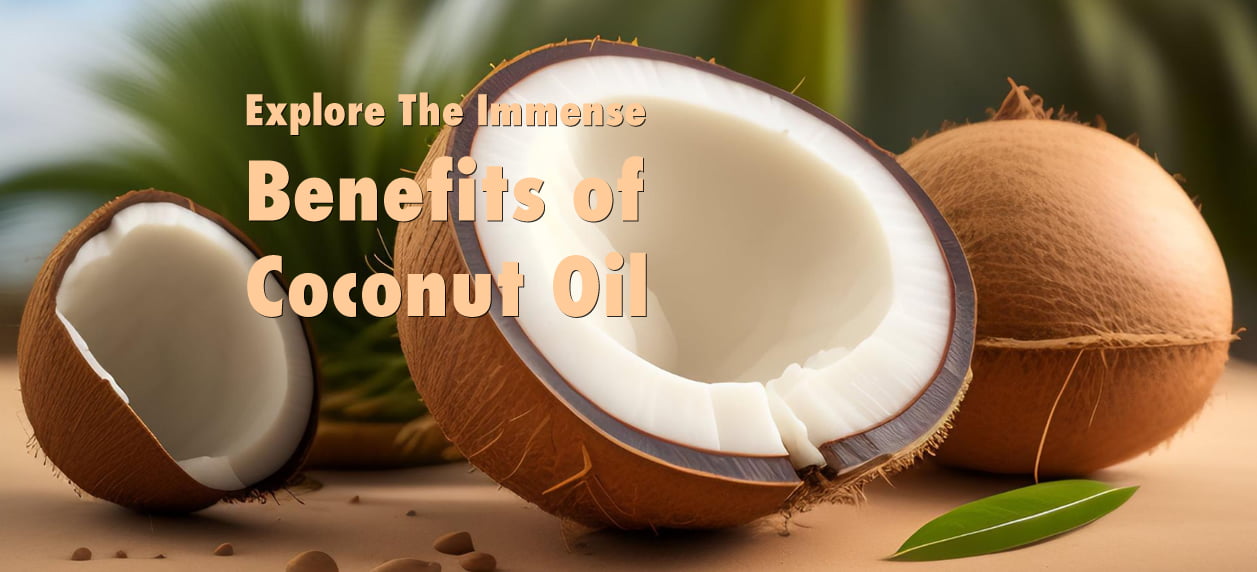When it comes to all-natural goods that have endured the test of time, coconut oil stands out as a versatile competitor with a long list of nutritional advantages. Its lengthy history is rich in culturally diversified culinary customs and holistic medical methods. Coconut oil has drawn acclaim and attention for its extraordinary health benefits, from the gastronomic pleasures it delivers to the table to the beauty-enhancing abilities it offers. The many benefits of coconut oil will be revealed in this thorough investigation as we delve into the most recent scientific findings, statistical information, and historical perspectives. Get ready to be amazed as we reveal this amazing natural wonder's hidden gem.
The Scientific Composition of Coconut Oil
Coconut oil is extracted from the meat of mature coconuts, a process that has been practiced for centuries. The composition of coconut oil has been subject to intense scrutiny, primarily due to its high saturated fat content. It is composed mainly of saturated fats, including medium-chain triglycerides (MCTs), which are unique in their structure and metabolism.
- MCTs and Heart Health: The association between saturated fats and heart health has been a topic of ongoing debate. The predominant fatty acid in coconut oil, lauric acid, is classified as a medium-chain fatty acid. Emerging research suggests that MCTs, such as those found in coconut oil, may affect cholesterol levels differently than long-chain fatty acids. Some studies propose that MCTs might increase levels of beneficial high-density lipoprotein (HDL) cholesterol more than detrimental low-density lipoprotein (LDL) cholesterol, potentially contributing to a more favorable lipid profile.
- Weight Management and Metabolism: The metabolic effects of coconut oil are of particular interest to those seeking weight management solutions. MCTs in coconut oil are readily absorbed by the body and rapidly metabolized, potentially leading to greater energy expenditure. A study published in the journal “Obesity” reported that consumption of MCTs led to increased feelings of fullness and higher fat oxidation compared to long-chain fatty acids. These findings suggest that coconut oil might aid weight loss efforts by promoting a sense of satiety and boosting metabolic rates.
- Cognitive Function and Brain Health: Beyond its role in nutrition, coconut oil's potential impact on cognitive function has intrigued researchers. The MCTs in coconut oil can be converted into ketones, which serve as an alternative energy source for the brain. Some studies propose that ketones might offer therapeutic benefits for individuals with neurodegenerative disorders, such as Alzheimer's disease. However, the extent of these potential cognitive benefits is still a subject of ongoing research and debate.
- External Applications – Skin and Hair Care: The benefits of coconut oil extend beyond internal health. Its application in skincare and haircare has been celebrated for centuries. Thanks to its high content of fatty acids, coconut oil serves as a natural moisturizer that helps lock in hydration. Research suggests that coconut oil can improve skin barrier function, increase skin hydration, and even alleviate symptoms of dermatitis. When applied to hair, coconut oil's ability to reduce protein loss and enhance hair shine has gained attention, making it a popular choice in natural hair care routines.
Latest Scientific Research and Findings
- Antimicrobial Properties: Coconut oil's lauric acid has demonstrated potent antimicrobial properties. A study published in the “Journal of Medicinal Food” investigated these properties and found that coconut oil exhibited inhibitory effects against harmful bacteria. This suggests its potential role in supporting oral health and preventing bacterial infections.
- Anti-Inflammatory Effects: Chronic inflammation is a contributing factor to numerous health conditions. Some animal studies have hinted at coconut oil's potential anti-inflammatory effects. A study conducted on rats demonstrated that virgin coconut oil reduced inflammation and oxidative stress markers, providing preliminary evidence of its anti-inflammatory properties.
- Rich Nutrient Profile: Beyond its fatty acid composition, coconut oil boasts a diverse array of micronutrients. A review published in the journal “Lipids” highlighted the presence of polyphenols and vitamin E in coconut oil. These compounds contribute to its antioxidant capacity, which may have implications for reducing oxidative stress and promoting overall health.
Statistical Insights into Global Coconut Oil Production
The global demand for coconut oil has surged over the years, driven by its perceived health benefits, culinary versatility, and wide-ranging applications. According to data from the United Nations Food and Agriculture Organization (FAO), global coconut oil production reached approximately 3.7 million metric tons in 2020. This figure reflects a steady increase in production from previous years, underscoring the growing prominence of coconut oil in both domestic and international markets.
Leading producers of coconut oil include Indonesia, the Philippines, and India. These countries possess tropical climates that provide optimal conditions for coconut cultivation. The production process involves extracting oil from the coconut meat through methods such as cold-pressing or expeller-pressing. While the industry's growth is promising, concerns over sustainability and ethical practices have come to the forefront.
Trends, Countries, and Geographical Dynamics
The global coconut oil industry is a dynamic landscape that has experienced significant shifts and growth in recent years. As the demand for natural and versatile products continues to rise, coconut oil has emerged as a prominent player in both culinary and health-conscious circles. Let's delve deeper into the statistical insights, exploring production trends, the involvement of key countries, and the geographical dynamics that shape this thriving sector.
1. Production Trends and Growth Patterns:
Over the past decade, the production of coconut oil has shown remarkable growth, reflective of its expanding popularity and diverse applications. According to data sourced from the United Nations Food and Agriculture Organization (FAO), global coconut oil production reached approximately 3.7 million metric tons in 2020, marking a steady upward trajectory from previous years. This upward trend signifies the increasing role of coconut oil in various sectors, from cooking to cosmetics, and its rising status as a sought-after ingredient in health and wellness products.
2. Leading Producers and Their Contributions:
Several countries play a pivotal role in the global production of coconut oil, each contributing to the supply chain in unique ways. Among these leading producers, Indonesia, the Philippines, and India stand out as key players. These nations possess favorable tropical climates that are conducive to coconut cultivation. Their combined efforts contribute significantly to the global coconut oil output, enabling the production of vast quantities of coconut oil to meet the burgeoning demand.
3. Geographical Dynamics and Climatic Influence:
The geographical distribution of coconut oil production is intricately linked to climatic factors and ecological conditions. Tropical regions characterized by warm temperatures and ample rainfall provide the ideal environment for coconut palms to thrive. As a result, countries situated within or near the tropical belt exhibit a natural advantage in coconut oil production. These areas not only foster optimal coconut growth but also facilitate the efficient extraction and processing of coconut oil.
4. Variations in Production Techniques and Methods:
The production methods employed in different regions can vary, impacting the quality and characteristics of the coconut oil produced. Traditional methods, such as cold-pressing and expeller-pressing, involve minimal processing and are favored for producing virgin coconut oil known for its distinctive flavor and potential health benefits. On the other hand, more industrialized methods may involve refining and bleaching to produce refined coconut oil, which possesses a neutral flavor and higher smoke point.
5. Sustainability Considerations and Challenges:
As the demand for coconut oil continues to rise, concerns about sustainability and ethical practices have come to the forefront. The expansion of coconut plantations can contribute to deforestation and habitat loss, raising ecological concerns. Furthermore, labor practices and fair wages within the coconut industry are topics of ongoing discourse, urging producers and consumers alike to prioritize ethical sourcing and responsible production practices.
Navigating the Global Coconut Oil Landscape
The global coconut oil production landscape is a fascinating amalgamation of natural resources, climatic conditions, and human ingenuity. With the demand for natural and health-centric products on the rise, coconut oil has transitioned from being a traditional staple to a versatile and sought-after commodity. As consumers, understanding the geographical dynamics, production trends, and sustainability considerations can empower us to make informed choices that align with our values while supporting the growth of an industry that spans continents and cultures. Whether in the lush plantations of Southeast Asia or the bustling markets of India, coconut oil's journey is a testament to its enduring appeal and its ability to bridge the gap between tradition and modernity.
Sustainability Considerations and Ethical Practices
The rise in coconut oil demand has prompted conversations about its ecological and social impact. The expansion of coconut plantations can lead to deforestation, which threatens biodiversity and disrupts local ecosystems. Additionally, labor practices in some coconut-producing regions have raised concerns about fair wages and working conditions.
Sustainable coconut oil production entails responsible land use, conservation of biodiversity, and fair treatment of workers. Certifications like Fair Trade and organic labels offer consumers assurance that the products they purchase adhere to ethical standards. As consumers, making informed choices about the coconut oil brands we support plays a crucial role in promoting sustainable practices.
Future of Coconut Oil Industry
Coconut oil's journey from traditional staple to modern superfood is marked by centuries of wisdom, scientific scrutiny, and global intrigue. While scientific consensus on some aspects of coconut oil is still evolving, its potential health benefits and diverse applications are undeniably captivating. The key lies in moderation and informed consumption, taking into account individual health profiles and needs.
Maintaining a balance between development and sustainability is crucial as coconut oil output rises. We can maximize the benefits of coconut oil while protecting the environment and upholding the values of the communities who support its development by remaining informed on the most recent research, advocating for moral behavior, and making thoughtful decisions. Coconut oil is a tribute to the glories of nature's abundance, whether you're enjoying its rich flavor in a culinary masterpiece or basking in its beauty-enhancing properties.



